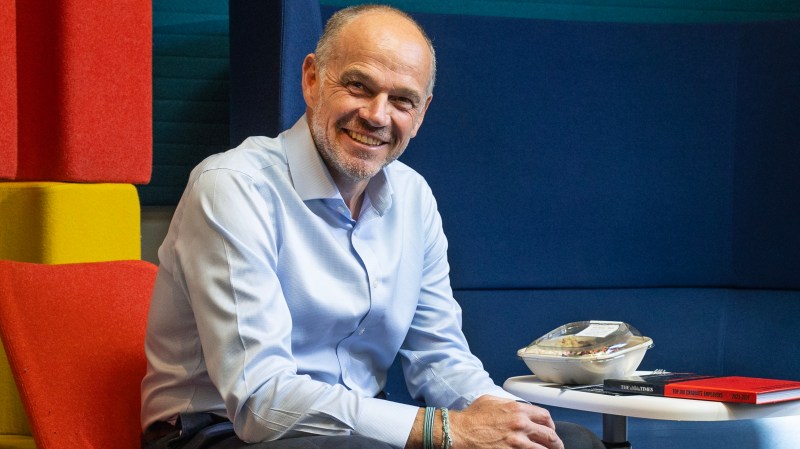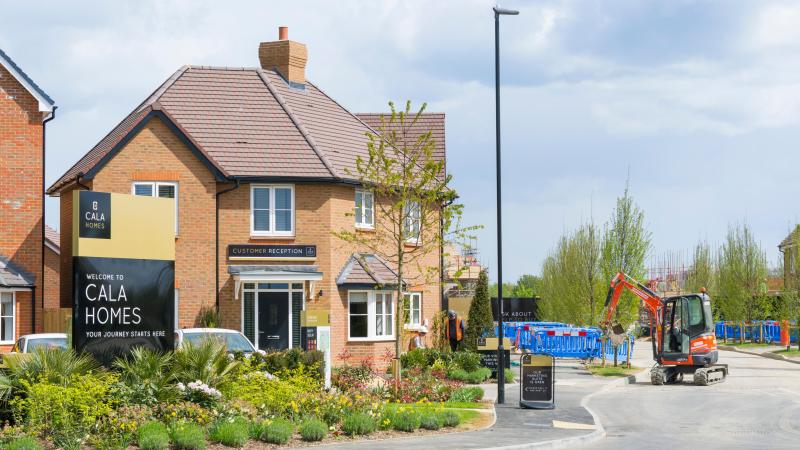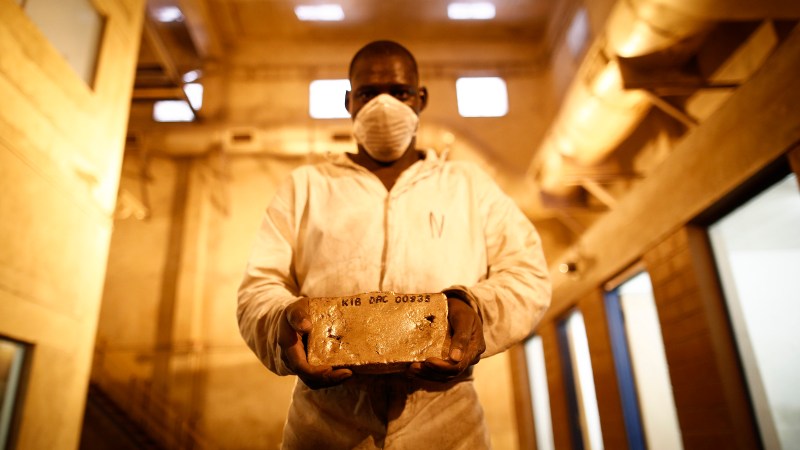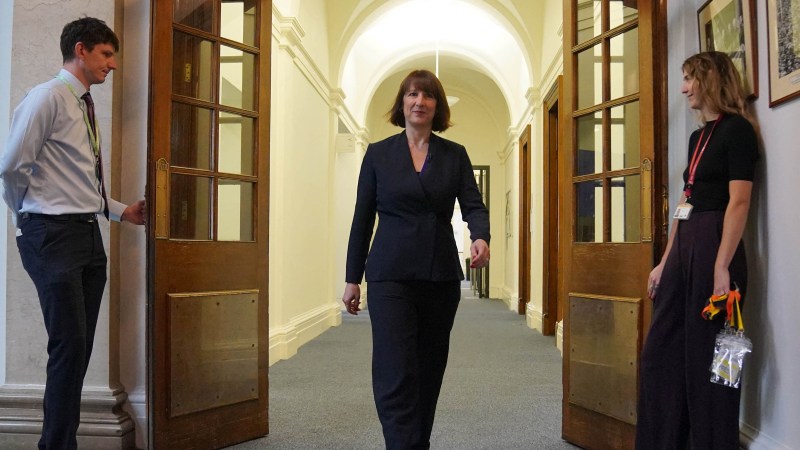‘Universities are short of money. That’s where we come in’
This isn’t the usual Lunch with The Times. Rather than a swanky West End restaurant, the venue is the canteen of King’s College London, an unglamorous but fitting place to meet Joe Lister, the chief executive of Unite Group, Britain’s biggest student landlord.
Obviously there’s no table service, so we grab some food and drinks before sitting down. Lister opts for the beetroot, hummus and couscous salad and I go for the chicken salad sandwich. Each of us takes a bottle of water out of the fridge. No starters or expensive wines here.
King’s College London has been chosen because it provides a significant revenue stream for Unite. The landlord lets out 70,000 rooms each year and almost 2,000 of them are filled by students from this institution.
Most of Unite’s halls bear little resemblance to the digs of old. Many now come with en-suites and students have access to gyms, cinema rooms and even karaoke booths. Like hotels, a 24/7 concierge is standard.
Lister insists that Unite is “mid-range” in terms of cost, although its most expensive rooms still fetch nearly £500 per week. Student rents have risen dramatically over the past couple of years. Unite has increased its rents by 7 per cent in each of the past two years and when it starts selling its rooms for the 2025-26 academic year this winter, rents are likely to go up by another 4 per cent to 5 per cent. The executive says the reasoning behind the rapid increase is simple: “More people want to go to university and there aren’t enough [rooms] being built.”


“Mom and pop” landlords are selling up because of tax and regulatory changes, while developers, hindered by soaring build costs and a complex planning system are building about half as many new halls every year as they were before the pandemic.
Lister accepts that the past two years have been “bumper years” for his business, but points out that Unite has increased its rents by less than inflation over that period. Could the group have pushed through bigger rises? “We could have, but that’s what gives me confidence for the next two or three years, because we’ve been fairly measured in what we’ve done. We’d rather see steady rental growth than big spikes and, reputationally, we’re not going to make friends with universities if we put up rents by 13 per cent just because we can.”
He opens up his salad box and I tuck into my sandwich. Think meal deal, but not as cheap. He is enjoying his food a bit more: “It’s very nice, although not as fancy as those other Lunches with The Times!”
He has always been into his health and fitness and still runs, cycles and plays a bit of tennis and squash. “I’m the youngest of three boys and grew up playing any game with a ball. I think that probably created my competitive spirit.”
Rugby was his main passion as a youngster. He supports Gloucester, which is near to where he grew up and not far from where he lives now. Unite’s head office in Bristol is a half-hour drive down the M5.
“I grew up on a farm and I always thought I was going to be a farmer, that was my first ambition. The team still takes the piss out of me because I’m up at five o’clock every morning sending emails. It’s just my farming background.”
Lister still has a West Country twang, although you’d think it would be stronger, given that, aside from a few years spent in the United States during his teens, most of his life has been spent in the region. He studied politics at the University of Bristol and ended up doing better than he thought in his finals. “I was obviously quite good at exams, so I thought why not go and do something that needs another three years of training?”
The accounting world beckoned. He started off in PwC’s audit team, but hated that and so moved into corporate finance, helping companies to raise money and working on deals. After eight years at PwC, he moved to what was then a little-known business called Unite, which was hiring for a corporate finance manager. “I was employee No 112 and my payroll slip still has that [number] on. My job was to find them money to help them to grow.”
Grow it has. When Lister joined in the summer of 2002, Unite had 3,000 beds and a stock market value of £200 million. Today it has 70,000 beds and is worth almost £5 billion, big enough to earn it a place in the FTSE 100.
Lister has been a key part of that growth. He was promoted to chief financial officer in 2008 and got the call-up to the top job at the start of this year. “[Being a chief executive] is not something that I longed to do, but I thought this is a great business which I’ve been a big part of and care passionately about and I feel I’m absolutely qualified to do it.”
His ascension comes at a tricky time for Britain’s higher education sector. Several universities are struggling financially, with tuition fees having been frozen for the past seven years, and there are worries about the long-term appeal of getting a degree. Lister is calm about both issues, given that Unite has made a concerted effort to own and build student halls of residence only in towns and cities that are home to high-ranked universities. Indeed, he calculates that 94 per cent of Unite’s beds are in cities that have a Russell Group university. The theory is that demand for the best universities will prove more resilient, which will ensure that Unite can fill up its buildings in those cities.
“The data has consistently shown that applications to high and mid-ranked universities have been stronger than to lower-ranked universities, which makes sense. You’re paying for it, so you want the best one with the best student outcomes.”
Lister expects school-leavers to keep choosing to go to university, if for no other reason that it still pays to do so. Government data shows that in 2023 the average salary was £40,000 for graduates, compared with £29,500 for non-graduates. The gap has remained at about £10,000 since 2007.
For overseas students, British universities remain attractive both in terms of cost and quality. “We’ve got more global top 200 universities than anywhere outside of the US, King’s being one of those.”City investors are clearly convinced by Unite’s approach. They have given Lister and his team another £750 million of their money over the past year or so. That will be spent on building new halls in places including London, Bristol, Edinburgh and Glasgow. In addition, a chunk will go towards a new partnership that Unite has formed with Newcastle University, which effectively has given its old Castle Leazes building to Unite to knock down and rebuild. The pair will split the rent that follows.
Lister wants to do one or two of these partnership deals every year if he can. “It won’t work for every university, but for a number of them it makes a lot of sense. It links back to the pressure on university finances. They want to grow, but they haven’t got the money to do so. That’s where we can come in.”
• Empiric Student Property or Unite – which is the best buy?
This is all to come. Right now he has more pressing issues as students come back for the new academic year. “The team puts me on car parking duty because I can’t do too much wrong there!”
This year there is an added stress because his youngest daughter is starting university. His two eldest have already flown the nest. Have his experiences as a dad shaped his thoughts as a chief executive? “The biggest lesson I’ve learnt is just being a bit more caring around that [arrival] period, helping them to settle in and providing more help in those first few weeks. We see it, rightfully so, as a commercial moment, but it’s remembering that the students don’t see it like that. This is a massive period of change.”
CV
Age: 52Education: University of Bristol, politics; Saïd Business School, University of Oxford (2014)Career: 1994-2002: PwC; 2002-present: Unite Group; 2014-17: council member, University of Essex; 2018-24: non-executive director, HelicalFamily: married, three adult daughters
Receipt
Roast beetroot, hummus and couscous salad £5.00Roast chicken salad sandwich £4.502 bottles of still water £2.20
Total £11.70






